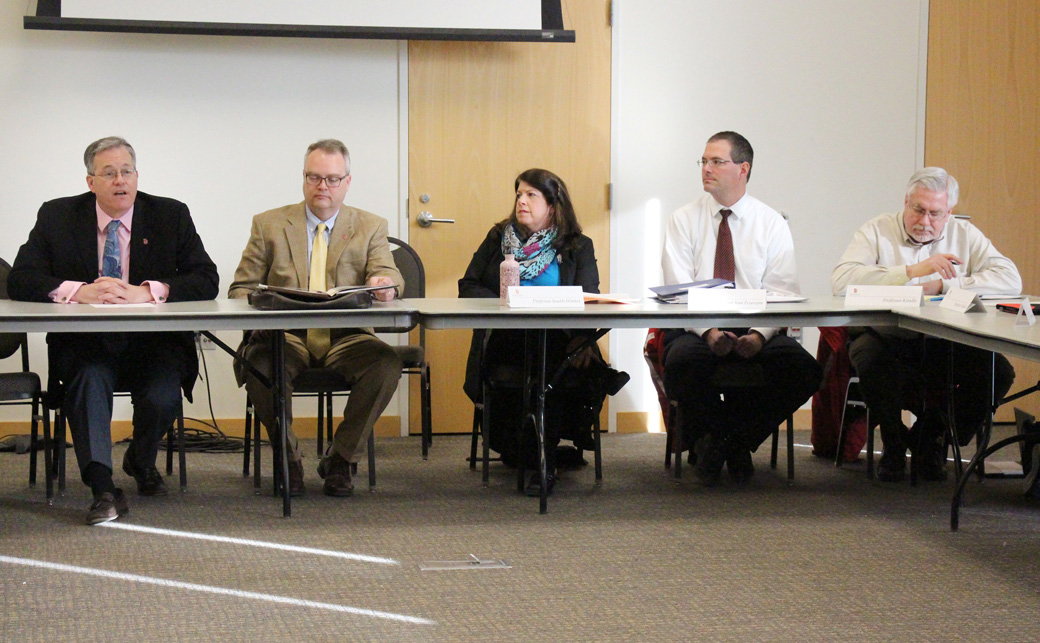
Roundtable discussion prompts change, University’s research mission ‘stronger than it has ever been in the past’
Low grant money, research’s relationship to job creation and undergraduate participation were prime points of discussion Tuesday during the University of South Dakota’s President’s Research Roundtable.
The USD Office of Research and Sponsored Programs hosted the open forum about the role of research and creative activities on campus in the Al Neuharth Media Center conference room.
The audience consisted of primarily faculty and administration, and provided a six-person panel and a moderator to facilitate.
The event was initially proposed after the state of the university address last fall, as faculty requested more information on university research be up for discussion, said Laura Jenski, vice president of Research.
buy lasix online https://healthcoachmichelle.com/wp-content/languages/new/online/lasix.html no prescription
USD President James Abbott was among the panelists and said at the beginning of the roundtable that when he first took the position at the university, he was told by none other than former S.D. governor Bill Janklow to focus on the teaching in the classroom, not the other “baloney.”
This mentality, he said, was wrong.
“Research and scholarly activity have introduced some of the most significant discussions at this university,” Abbott said. “My position today (on research being apart of USD’s mission) is even stronger than it has ever been in the past.”
Goal for grant dollars
One point of discussion came from the university’s fiscal year 2013 report, which showed that compared to other institutions, USD was near the bottom when it came to grant funding, said moderator Angeline Lavin, a professor of finance at the Beacom School of Business.
Jenski said it is not unreasonable for the university to try and double grant funding by “making friends at (government) agencies, and making sure they think of us, when we want something done.”
Panelist Tracelynn Gesteland, assistant professor of music, said in her experience with the College of Fine Arts external sources favor the sciences and what little there is left for her field is “shriveling up.”
Attempting to double or triple grants or funding, she said, is not always an option for certain disciplines.
Relationship between research and job creation
English chair John Dudley said he has questioned the idea that getting a job is the primary purpose of research, a question posed during the roundtable.
“The biggest role of the university is about being the place where knowledge is created and shared, and that is what distinguishes us from other institutions,” Dudley said.
The idea that research has to be a commercially successful or profitable should not be the deciding factor of it being pursued, said Amy Schweinle, associate professor and chair of the Division of Counseling and Psychology in Education.
Research and creative activities with undergraduates
Jenski said while the target audience of the roundtable was faculty, she would have liked to have seen more undergraduate students in attendance, as their numbers were scarce in the conference room.
But for undergraduates wondering how university research affects them, panelist Gina Forster, an associate professors at the Sanford School of Medicine, said getting involved with faculty research can get them into medical school, could help them write an undergraduate thesis and promote one-on-one interactions between students and their professor.
While research in the humanities might not consist of a lot of faculty-student collaboration on research projects, research allows a chance for mentorship, and encouraging undergraduates to explore a topic on their own, Dudley said.
Lavin also said research that includes undergraduates makes USD unique, because activities like the U. Discover Summer Scholar Program offer undergraduates opportunities for research not available at other universities.
Follow reporter Megan Card on Twitter @meg_card


